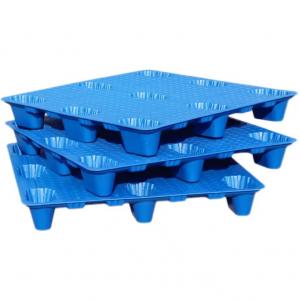Source Manufacturer Of Pallet Heavy Duty 3 Ton 1200x1000 Plastic Pallet
EPP pallet benefits:
EPP (expanded polypropylene) pallets offer a number of benefits over traditional pallets, including:
- Reduced shipping costs: EPP pallets are significantly lighter than wooden or plastic pallets, which can help reduce shipping costs and improve logistics efficiency.
- Increased durability: EPP is a highly durable material that can withstand impact, vibration, and other types of stress. EPP pallets can also be designed to be resistant to moisture, chemicals, and temperature extremes, which can help ensure the safe transport of goods.
- Improved safety: EPP pallets are free from sharp edges or splinters, which can help reduce the risk of injury to workers handling them. They are also less likely to break or crack, which can help prevent accidents or damage to goods during transport.
- Sustainability: EPP pallets are reusable and recyclable, making them a more sustainable option for businesses looking to reduce their environmental impact. They can be easily cleaned and sanitized for reuse in a variety of applications.
- Customizability: EPP pallets can be designed and customized to meet specific application requirements, such as size, shape, and load capacity. This can help optimize logistics and improve efficiency.
- Improved product protection: EPP pallets can absorb shock and vibration, which can help protect goods during transport and prevent damage.
Overall, the benefits of EPP pallets make them a popular choice in industries such as food, pharmaceuticals, and electronics, where cleanliness, durability, and sustainability are important considerations.
Parameter table:
| Property | Description |
| Material | Expanded Polypropylene (EPP) |
| Weight | Lightweight, typically between 2 and 5 kilograms |
| Load Capacity | Can support loads up to 1,000 kilograms |
| Durability | Resistant to impact and crushing; can withstand multiple trips and handling |
| Temperature Resistance | Can withstand temperatures ranging from -40°C to 120°C |
| Hygiene | Easy to clean and sanitize; resistant to moisture, chemicals, and bacteria |
| Sustainability | Can be recycled and reused multiple times; produces fewer greenhouse gas emissions compared to other pallet materials |
| Applications | Used in various industries, including food and beverage, pharmaceuticals, and electronics |
| Cost | Generally more expensive than wooden pallets but may offer cost savings over time due to durability and reusability |
